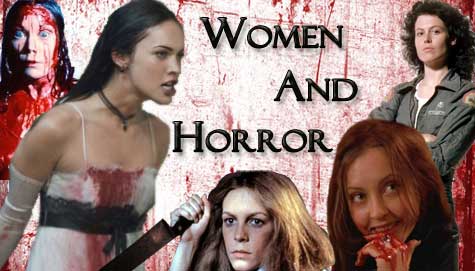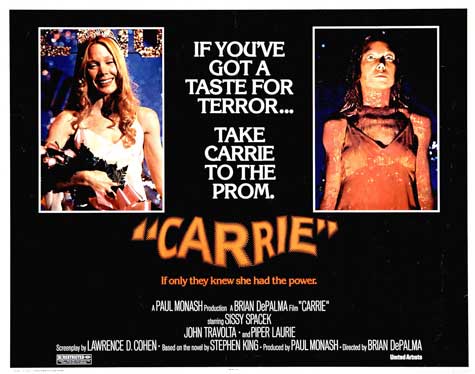
“It is women who love horror. Gloat over it. Feed on it. Are nourished by it. Shudder and cling and cry out—and come back for more.” — Bela Lugosi
Being a woman is not easy.
For a lot of reasons, of course, and some of those reasons are downright horrific. There's a lot of gross body stuff (for those born biologically female) that we put up with every month for thirty or forty years, to start with.
Then there's pregnancy, when ladies are physically supporting a life—or parasite, as some would describe it—right up until the moment it bursts out of the womb like that dinner scene in Alien…
Okay, maybe it's not quite that bad. But it's still terrible and awesome, and a really great example of how women can be more hardcore than men. I'd like to see any of the muscle-bound guys in a summer blockbuster handle childbirth or menstrual cramps.
Given how extreme physical changes can be for ladies, it shouldn't be surprising that there are a lot monstrous body horror narratives we connect to on a visceral level. Or that so many lady-led horror flicks home in on topics like sexuality, motherhood, and the dangers of being female in a world full of violence directed at women.
HELL IS A TEENAGE GIRL
“There's something dangerous about the boredom of teenage girls.” — Megan Abbot (Dare Me)
I always find it hard to believe someone when they say their high school years were some of the best of their life. There's a reason why so many horror movies happen in a high school setting: it's a dangerous place full of hormones, bullies, the unpleasant effects of puberty, social booby traps, stress, and constant conflict. And for girls it can be especially hellish.

Long before there were anti-bullying campaigns, Carrie (1976) showed us how teenage cruelty can lead to outright death and bloody trauma. Not only does poor Carrie White (Sissy Spacek) have to deal with an abusive zealot of a mother and frightening physical changes in her own body, she also has to bear the slings and arrows of a vicious body of students who delight in harassing her.
Honestly: when the telekinesis kicks in, it's almost the least of her worries.
Carrie has become the gold standard of bully-based horror for a reason. The book and movie perfectly capture the petty spitefulness and emotional brutality of youth, particularly the forms of abuse heaped on girls. Most victims don't have violent telekinesis to turn to when their tormentors take things too far, but the fact that Carrie could literally pull the school down onto her attackers feels more like justice than anything else.
And the casting of Spacek as Carrie was brilliant. She's a weedy, awkward thing with huge, staring eyes and the body language of a startled rabbit. Everything about her screams “victim”; when the more mature and confident girls begin to mock and attack her, the audience has a gut-reaction to leap forward and defend her. In that moment, she's your sister or cousin or neighbor, and it's painful to watch such dreadful things happen to her.
Carrie also highlights how difficult things can be for girls who don't fit the definition of “normal,” both in appearance and in behavior. She's the weird kid with an uber-religious mom and out-of-fashion clothes. She doesn't wear make-up or do any of the activities other girls her age are involved in. Because she doesn't match up with the ideals maintained by her peers, it comes across as acceptable to punish her.
From a very young age, girls are taught that they constantly have to “perform” in public. They have to dress, talk, and behave in a certain way. Any deviation from those standards is seen as strange or bad. But the standards are so narrow and contradictory that we're basically set up for failure from the start. We're either too much one way or not enough the other. A slut or a prude; a know-it-all or a ditz; a geek or a fake.
Fast-forward almost forty years later and a very different kind of supernatural girl is walking the fluorescent-lit halls. Jennifer's Body (2009) may be known as “that movie where Megan Fox is naked and eats some guys”, but it's a better film than most give it credit for. The titular Jennifer (Megan Fox) is mistaken for a virgin by an up-and-coming rock band desperate for guaranteed success, and when they sacrifice her to Satan in exchange for fame and glory, things don't work out quite as intended.
Jennifer comes back… Well, sort of. She's no longer a confident, sexy cheerleader. She's now a confident, sexy cheerleader succubus who has to regularly eat horny boys in order to survive. This leads to understandable conflict with childhood friend and outsider Needy (Amanda Seyfried) and tests the bonds of their BFF necklaces.
 What makes Jennifer's Body so delightfully subversive is how it plays out the “teenage vixen” trope. Jennifer didn't ask to become a succubus and didn't deserve such a transformation, regardless of how sexually promiscuous she may have been before. A group of men try to kill her for their own selfish ends and she returns as a creature specifically tailored to destroy men. Poetic justice at its schlockiest.
What makes Jennifer's Body so delightfully subversive is how it plays out the “teenage vixen” trope. Jennifer didn't ask to become a succubus and didn't deserve such a transformation, regardless of how sexually promiscuous she may have been before. A group of men try to kill her for their own selfish ends and she returns as a creature specifically tailored to destroy men. Poetic justice at its schlockiest.
While Jennifer is somewhat indiscriminate in her attacks, assailing a couple of decent guys as well as the requisite “dudebros”—and we're definitely supposed to be cheering on outcast Needy in her efforts to destroy Jennifer—we also can't help but sympathize with her just a little bit. If you had been sacrificed to Satan in exchange for a record deal, wouldn't you want to eat some dudes, too?
“You're killing people!” screams Needy, but Jennifer just replies, “No, I'm killing boys!” and the distinction is a pretty important one in this movie. Given how teenaged girls are so often abused, used, and brutalized by their male classmates (and teachers, and coaches, and…), it's a pointed bit of commentary. What's the moral stance when the tables are turned and it's no longer the girl that's the victim caught on camera? Is she a monster, or a force of righteous vengeance?
And while we're speaking of the outright monstrous in high schools, we can't overlook the cult classic Ginger Snaps (2000), where a girl's first period arrives in tandem with a werewolf attack.
Ginger (Katherine Isabelle) is a different person in the aftermath, coming into her sexuality in bloody, terrible ways. After losing her virginity to a boy at school, it's revealed that lycanthropy can be a sexually-transmitted disease. Sure does lend a bit more weight to the credo of safe sex and teaching beyond an abstinence-only curriculum.
The further she progresses into her monstrous state, the more beguiling she becomes to the opposite sex and the more desperate her sister is to cure her before anyone else dies. “I get this ache… And I, I thought it was for sex, but it's really to tear everything to effing pieces,” confesses Ginger after a particularly shocking attack.
Werewolves have traditionally been depicted in very masculine contexts, with a focus on alpha males and strict pack hierarchies. This just makes Ginger Snaps all the more refreshing. Given how lycanthropy is almost always tied to the cycles of the moon, and the transformation from human to wolf is often painful and bloody, it makes perfect sense to draw allusions to menstruation and femininity.
And, at least in American society, a woman who fully embraces her body and sexuality is typically frowned upon and seen as dangerous. She's given unpleasant labels and gossiped about. She has a reputation or is slighted in public. She, essentially, become something uncomfortable and even monstrous. Tying back to the themes in Carrie and as Ginger herself says: “A girl can only be a slut, a bitch, a tease, or the virgin next door.”
Women are often categorized and then judged by their labels. When the women in horror fully embody those labels, they sometimes become literal monsters. And when they then act according to their monstrous nature, well, you can't really blame them, can you?
Angie Barry wrote her thesis on the socio-political commentary in zombie films. Meeting George Romero is high on her bucket list, and she has spent hours putting together her zombie apocalypse survival plan. She also writes horror and fantasy in her spare time, and watches far too much Doctor Who. Come find the angie bee at Tumblr.
Read all posts by Angie Barry at Criminal Element.

I love this so much! These are three of my favorite films and I absolutely love your commentary. I can’t wait for the next installment!